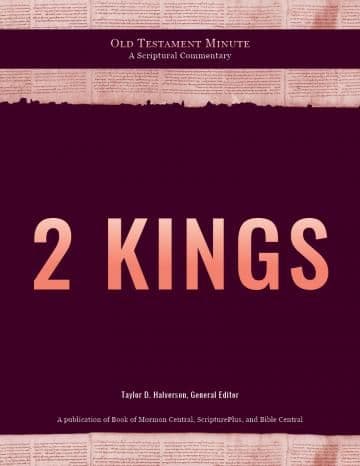Book
6 Chapters

Jehoram was wicked king but was not as bad as his father since he at least removed the Baal idol his father made (see 1 Kings 16:31–33).
In 1868 Frederick Klein, a French missionary, discovered the Mesha Stele, or as it is sometimes known, the Moabite Stone. The Moabite Stone was created by Mesha, king of Moab, around 840 BC and has thirty-four lines of text in Paleo-Hebrew describing Mesha’s reign and the Israelite subjugation of Moab because the Moabite god Chemosh was angry with his people. The Moabite Stone is one of the oldest mentions of biblical people outside of the Bible. The oldest is the Merneptah Stele from 1200 BC that mentions Israel.
Throughout their history, the two Israelite kingdoms were often at war, but in this case they made an alliance against Moab. Jehoshaphat’s pledge is six words in Hebrew, each starting with the same prefix. This prefix is a k sound meaning “as.” Then each word alternates between your and my suffixes. The result of the same starting sound and alternating ending sounds may have been a kind of poetic response for treaties in ancient Israel. This is effectually very similar to the Spanish phrase “mi casa es su casa” or the Latin phrase “veni, vidi, vici,” attributed to Julius Caesar.
The kings of Judah and Israel joined forces with the king of Edom, Moab’s neighbor to the south. They then planned to attack Moab from an unexpected direction by traveling seven days through the Negev Desert, one of the most desolate in the area. First Kings 22:47 says, “There was then no king in Edom: a deputy was king.” The king of Edom was likely Jehoshaphat’s client king, similar perhaps to the role Mesha held before he rebelled against Jehoram.
In 1 Kings 19:21 we’re told Elisha ministered to Elijah. How much of that ministering was spiritual versus physical is not apparent there, but this passage seems to imply there was a physical aspect to Elisha’s duties to Elijah, even if it was just for ritual handwashing.
The music seems to have put Elisha into a state of mind in which he could channel the word of the Lord. This is reminiscent of how music affected Saul in 1 Samuel both when David played for him to soothe his rage and when the Spirit of the Lord came upon him and he could prophesy.
The valley is a Middle East wadi, or seasonal stream. Most of the year they are dry, but since the Lord commanded the valley to be “full of ditches,” this wadi would have retained water in pools that the armies could use for themselves and their animals. Depending on how the words are read, either the Lord commanded the soldiers to dig ditches that were later filled with water, or the Lord commanded that pools of water would exist in the wadi.
For some reason, perhaps because of the red rocks’ reflection in the pools, the Moabites saw these pools of water as pools of blood and incorrectly assumed that the alliance between the two Israelite kingdoms and Edom did not work out and that the three assembled armies ended up fighting with each other. Moab decided to press an attack.
Kir-haraseth, modern el-Kerak in Jordan and a formidable city on a steep hill, was likely the capital of Moab. Kerak Castle, built during the Crusades, still stands there. It’s one of the largest fortresses in the Middle East. It appears from the text that the allied armies surrounded Kir-haraseth and lay siege for a short while but ultimately did not take it.
Mesha tried to break out of the siege but failed and in desperation attempted to win favor with Chemosh, the god of Moab, by sacrificing his eldest son on the walls of the city. “Great indignation against Israel” is a mysterious twist in the story. Some apologists assume it’s incorrect and should be read as “great indignation against Moab.” Based on the general abhorrence of human sacrifice in the Bible, this might be correct. Another way to look at it is that Israel was the invader and pushed Mesha to the point where he felt it necessary to sacrifice his own son, all because Mesha wouldn’t pay Israel his tribute. It is also notable that Elisha was absent from this part of the campaign.
Items in the BMC Archive are made publicly available for non-commercial, private use. Inclusion within the BMC Archive does not imply endorsement. Items do not represent the official views of The Church of Jesus Christ of Latter-day Saints or of Book of Mormon Central.